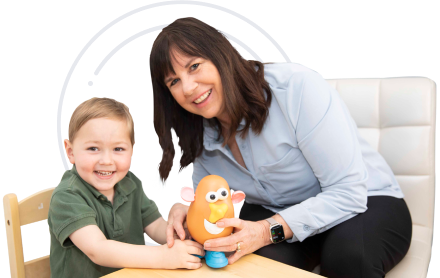Held Back or Kicked Out of Daycare or Preschool?
Dr. Mary Barbera
Want to Learn how to Increase Talking & Decrease Tantrums in Children with Autism or Toddlers Showing Signs?
Want to start making a difference for your child or clients?

And they were worried about him progressing to the 3-year-old pre-school the following year because the ratio of staff to students was going to go up, so there were going to be more kids with less teachers.
I wrote a short action guide, which you can download right below this video. It’s called, Is It Autism, ADHD, or Typical Toddler Tantrums?: 3 steps you can take today instead of worrying. The 3 steps mentioned in the book in a lot more detail are these:
1) You need to know what the milestones are of typically developing kids of your child’s age. So, if you have a 2-year-old or if you have a 15-month-old or you have a 3-year-old, the best place that I have found is the CDC website, which lists typical development milestones. This is in the area of language and social skills, but also in the area of physical development. So, if you’re worried that your infant is not pulling themselves up when they should or rolling over or standing up, or if you’re worried that your 2-year-old should putting 2 or 3 words together, how should they be interacting with peers, should they still be on parallel play or interacting more? The link to the CDC milestones is within the action guide.
2) Contact your child’s doctor and make a sick visit. Most people don’t think of making sick visits for developmental concerns but this is where I’d start. It’s also really wise to get an early intervention evaluation to get standardized testing done free of charge in the United States, so that you can see standardized testing methods to compare your child’s development with typical development, and see what areas are of concern and how far they are delayed.
3) Learn more about Applied Behavior Analysis or ABA therapy, because that is and remains the most proven therapy for children with autism and related disorders. So don’t let people tell you that, “Oh, it’s just a mild case of autism. They don’t need ABA.” Or, “They’re too high functioning for ABA.” Or that your child just has ADHD, they wouldn’t benefit from ABA, because the fact is that every child would benefit from ABA therapy and there are techniques that you can learn to do in your home without paying or driving your child anywhere.
Want to Learn how to Increase Talking & Decrease Tantrums in Children with Autism or Toddlers Showing Signs?
Want to start making a difference for your child or clients?
